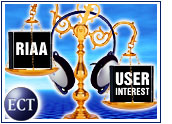
Privacy advocates and foes of the Recording Industry Association of America’s campaign to subpoena the names of file-sharing computer users from universities and service providers have won a small battle in the war over online music trading. A U.S. District Court has invalidated the RIAA’s subpoenas to two Massachusetts universities.
The court upheld arguments by MIT and Boston College that subpoenas requesting information about university students may not be obtained in Washington, D.C., where the RIAA filed the rest of the estimated 1,000-plus subpoenas it has used to seek out illegal file sharers.
The RIAA can either appeal the case or simply file for the subpoenas in the proper jurisdiction. The ruling coincided with an ISP coalition’s request for more information about the RIAA subpoena campaign, which is drawing increasing amounts of opposition.
Subpoena Source
The RIAA has refused to indicate how many subpoenas it has filed in its quest to prosecute individual file traders, but the number is estimated to be at least 1,000 and growing by roughly 100 per day, Electronic Frontier Foundation senior staff attorney Fred von Lohmann told TechNewsWorld.
The EFF, which offers an online database that lets users check to see if their identities have been subpoenaed, said the Massachusetts ruling requires the RIAA to file subpoenas where it alleges the copyright infringement has occurred.
Thus far, all of the RIAA’s subpoenas have been issued from the Washington, D.C., court, according to von Lohmann.
RIAA Resistance
In urging the court to reject the subpoenas, the two Massachusetts universities echoed one of the arguments used by SBC, which is suing the RIAA over the subpoenas through its Pacific Bell Internet Service.
In addition to the jurisdictional issue, SBC also is arguing that the subpoenas are unconstitutional and improperly use the subpoena power granted by the Digital Millennium Copyright Act, which requires ISPs to provide the information if subpoenaed.
Communications giant Verizon also challenged the RIAA subpoenas but lost in court in June. Verizon is appealing that case. Yankee Group senior analyst Mike Goodman told TechNewsWorld that while the costs of litigation might limit resistance from ISPs, they all likely share apprehension over the RIAA strategy.
“The bottom line is that no ISP wants to be in the policing position they’re being put in,” he said, adding that the recent formation of an ISP coalition likely will serve as the foundation for lobbying efforts against the RIAA subpoena strategy.
Procedural Response
In response to the Massachusetts court ruling, the RIAA said in a statement that the ruling is “a minor procedural issue and does not change an undeniable fact –when individuals illegally distribute music online, they are not anonymousand service providers must reveal who they are.”
The RIAA, which indicated it will continue to seek the identities of alleged copyright violators, also questioned a letter from a group of ISPs and said it has already reached out to many ISPs to discuss concerns about its subpoenas.
“We look forward to dispelling some of the gross inaccuracies contained in the letter, and hope that these ISPs will help to foster the legitimate online music marketplace,” the statement said.
Strategy Questioned
Although the majority of ISPs subpoenaed have complied as required by the DMCA, a group of Internet companies known as NetCoalition sent a letter to the RIAA requesting more information about the subpoena strategy.
“We strongly support the right of copyright owners to protect their works, but there is a real potential for abuse with what the RIAA is doing,” wrote NetCoalition executive director Kevin McGuiness. “Handling a single subpoena request is costly for Internet companies. They are not equipped, nor should they be, to assess the legality or validity of these claims, especially when the privacy rights of their subscribers are at risk.”
The letter, which questions how individuals are being targeted, what is being done with the requested information, how it is protected and who pays for compliance, states that the RIAA’s initiative could force providers to raise the price of Internet access “simply to fund the RIAA’s legal fishing expedition.”






















































So why don’t we all find a good team of lawyers and mount a class-action suit on behalf of music listeners everywhere?
The case would be that we have all purchased music in various forms (LP, cassette and eight-track tape, CDs) which either wore out, got eaten by faulty tape drives, were lost, etc. We purchased the music in good faith. But we are all (well, many of us) now being penalized by the RIAA Nazis for rightfully obtaining what belonged to us in the first place.
Proceeds (which should be in the billions of dollars) could go towards setting up an organization which genuinely represents musicians and not the rip-off artists who have been stealing music rights from their creators since the days on Tin Pan Alley.
You’re on to something.
But remember that there are only 12 notes, and unless there is actual plagiarism, everyone’s entitled to proper compensation.